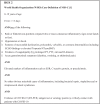Multisystem Inflammatory Syndrome in Children (MIS-C)
- PMID: 35314921
- PMCID: PMC8938222
- DOI: 10.1007/s11882-022-01031-4
Multisystem Inflammatory Syndrome in Children (MIS-C)
Abstract
Purpose of review: The novel coronavirus disease 2019 (COVID-19) is caused by severe acute respiratory syndrome coronavirus 2 (SARS-CoV-2) and has developed into a pandemic. A unique challenge of this pandemic has been the emergence of multisystem inflammatory syndrome in children (MIS-C), a rare post-infectious hyperinflammatory disorder associated with SARS-CoV-2. This syndrome is characterized by overwhelming systemic inflammation, fever, hypotension, and cardiac dysfunction. This disorder may also have features overlapping with Kawasaki disease (KD), macrophage activation syndrome (MAS), and toxic shock syndrome (TSS). The goal of this review is to outline the presenting features, presumed immunopathogenesis, management, and outcomes of patients with MIS-C.
Recent findings: Patients with MIS-C present with characteristics that fall within a wide clinical spectrum. Main features include fever, gastrointestinal symptoms such as abdominal pain and diarrhea, and cardiac complications such as myocarditis and coronary artery aneurysms, although various other features have been reported. Younger children may present with features of Kawasaki-like disease, and older children are often admitted to the intensive care unit with cardiogenic shock. Current treatment guidelines recommend intravenous immunoglobulins (IVIG) and glucocorticoids, with utilization of biologics in refractory cases. Fortunately, the majority of patients recover, with resolution of the systemic inflammation and cardiac abnormalities. Mortality from MIS-C is rare. This review provides an overview of the presenting features, proposed pathogenesis, suggested therapies, and outcomes of MIS-C. Clinicians must have a high clinical suspicion for this disorder in children who have had recent COVID-19 infection or exposure and present with a significant inflammatory response. Understanding of this disorder continues to evolve, and prompt diagnosis and treatment allow for the best possible outcome for patients with MIS-C.
Keywords: COVID-19; Multisystem inflammatory syndrome in children (MIS-C); Pediatric inflammatory multisystem syndrome; SARS-COV-2.
© 2022. The Author(s), under exclusive licence to Springer Science+Business Media, LLC, part of Springer Nature.
Conflict of interest statement
Julisa M. Patel declares that she has no conflict of interest.
References
-
- World Health Organization. 2022. https://www.who.int/emergencies/diseases/novel-coronavirus-2019.
-
- Lu X, Zhang L, Du H, Zhang J, Li YY, Qu J, Zhang W, Wang Y, Bao S, Li Y, Wu C, Liu H, Liu D, Shao J, Peng X, Yang Y, Liu Z, Xiang Y, Zhang F, Silva RM, Pinkerton KE, Shen K, Xiao H, Xu S, Wong GWK; Chinese Pediatric Novel Coronavirus Study Team. SARS-CoV-2 infection in children. N Engl J Med. 2020;382(17):1663–1665. 10.1056/NEJMc2005073. - PMC - PubMed
-
- American Academy of Pediatrics. 2022. https://services.aap.org/en/pages/2019-novel-coronavirus-covid-19-infect....
Publication types
MeSH terms
Supplementary concepts
LinkOut - more resources
Full Text Sources
Other Literature Sources
Medical
Research Materials
Miscellaneous



